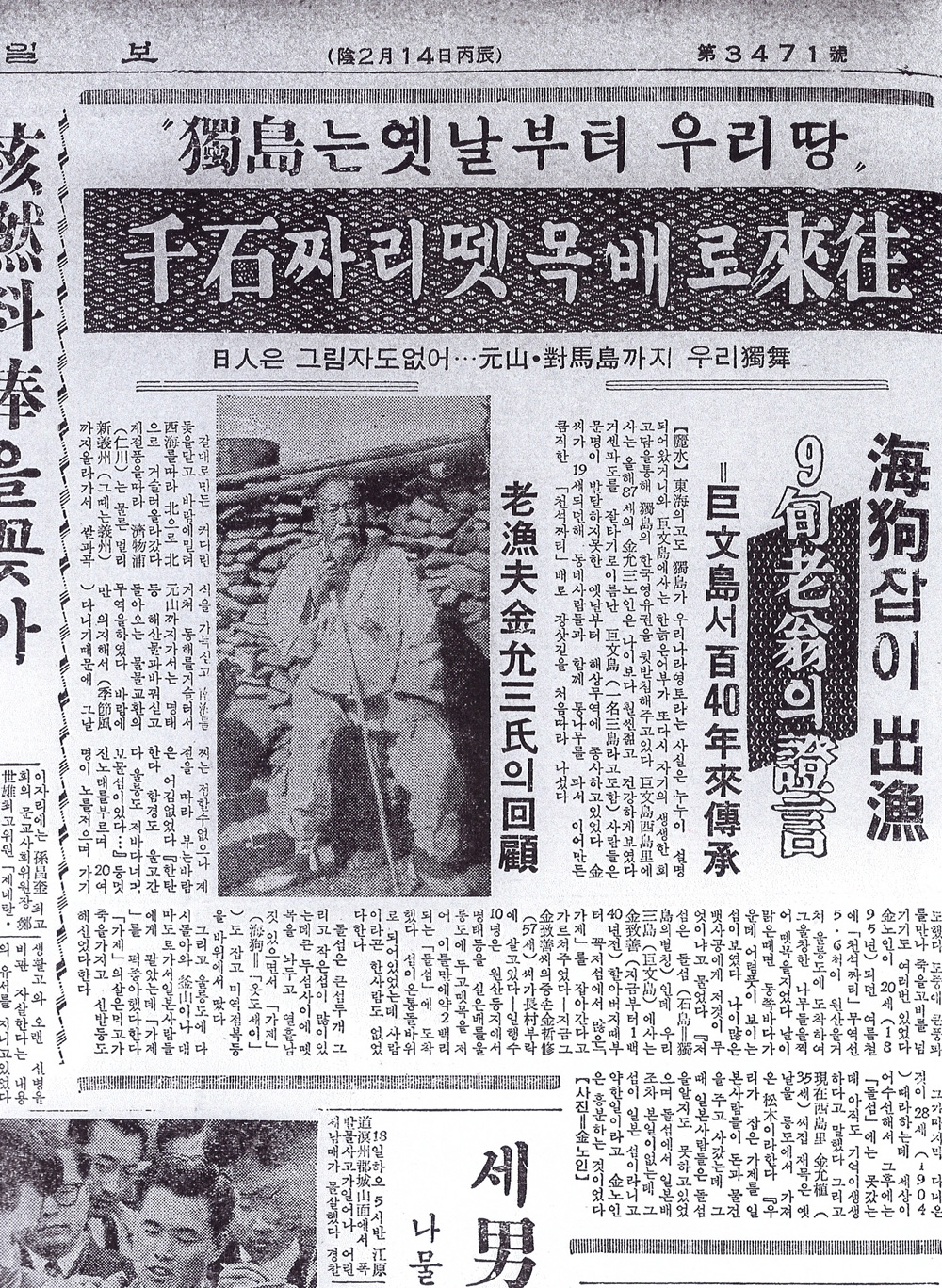Dokdo, the First Victim of Japan’s Aggression Against the Korean Peninsula
02. “Dokdo Has Been Territory of Korea Since Ancient Times, Comings and Goings Made by Large ‘Thousand-Seok’ Rafts,”
MinkukIlbo (March 19, 1962)
Dokdo Has Been Territory of Korea Since Ancient Times
“Dokdo Has Been Territory of Korea Since Ancient Times, Comings and Goings Made by Large ‘Thousand-Seok’ Rafts,” Minkuk Ilbo (March 19, 1962)
[Translation]
Dokdo has been a territory of Korea since ancient times, comings and goings made by large “thousand-seok” rafts.
There was no single Japanese shadow… The sea stretching from Wonsan to Tsushima was ruled by us the Koreans.
Testimony by a nearly 90-year-old man who sailed out to hunt sea lions
A tale passed down in Geomundo Island for 140 years
A recollection of old fisherman Kim Yun-sam
Yeosu – It has been explained many times that Dokdo, an isolated island in the East Sea is part of Korea’s territory. Now, an old fisherman living on Geomundo Island has provided his vivid recollection that further supports Korea’s sovereignty over Dokdo. Kim Yun-sam, who is 87 years old and lives in Seodo-ri, Geomundo, looked much younger and healthier than his age. Residents of Geomundo (also known as Samdo) are renowned for their sailing skills in rough seas and have been engaged in seaborne trade since old times, when civilization was underdeveloped. When he was 19 years old, Kim joined other villagers on his first trade voyage by a “thousand-seok” (meaning it can carry 1,000 bags of rice) raft made of gouged, connected logs.
They put up large sales made of reeds and were pushed by winds further and further north along the West Sea. On seasonal winds, they sailed to Jemulpo (the present Incheon) and further up to Sineuiju (then Euiju) where they loaded their raft-ship with rice and other grains to the full. They then turned south to the South Sea and sailed the East Sea up to Wonsan where they bartered their cargo for marine products like pollack before returning home. They depended entirely on seasonal winds, so they did not know when they would reach their destinations, though the winds always came. Some 20 of them also rowed, singing wonderful songs together like, “I lament, Hamgyeong-do; I cry, Ulleungdo; there’s a treasure island out over the water…” During their voyage, they escaped death against spells of wind and waves several times.
In the summer of 1895 when Kim was 20, he came to Ulleungdo with a fleet of five or six “thousand-seok” trade ships by way of Wonsan. They lumbered trees in the island’s dense forest and made rafts from them. He could vaguely see an island in the middle of the sea to the east on clear days. He asked an old sailor about the island, and he answered, “The island is Dolseom (or Seokdo, other names of Dokdo), and from the time of Samdo (Geomundo) village elder Kim Chi-seon 140 years ago, Geomundo villagers have come to the island and hunted many sea lions.” (Currently Kim Cheol-su, 57, a great-grandson of Kim Chi-seon, lives in Jangchon Village on Geomundo.) His party of ten people left at Ulleungdo their ships, which had been loaded with pollack and other cargo in Wonsan and other places, and rowed wooden rafts for two days to Dolseom, some 200li (79km) away. The island was covered with rocks all over and there was no trace of even one person. Dolseom consists of two large islands and many small islands. They moored their rafts between the two large islands and stayed there for some ten days, catching sea lions and collecting sea mustard, abalone, and other things from the rocks. Then, they brought their catch back to Ulleungdo and went to Busan or Tsushima to sell them to the Japanese, who quite liked sea lions. They ate the flesh and made shoes and other things with their skins. He said his last visit to Dokdo was when he was 28 years old (in 1904), and as it was then the time of troubles, he never made it back to Dolseom but still vividly remembered the island. He added that the timber used in the house of Kim Yun-sik (35) in Seodo-ri is pine brought from Ulleungdo from those times. “Japanese people bought the sea lions we caught with money or by bartering, and they did not have a clue about Dolseom. We never saw a Japanese ship around Dolseom. It is outrageous that they argue it belongs to Japan,” the old man angrily said. (Photo of Kim)
[Original Text]















